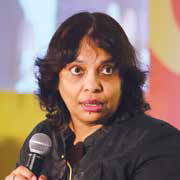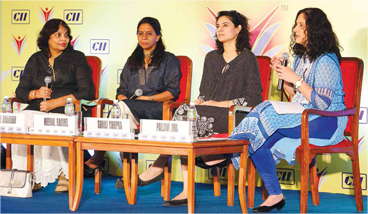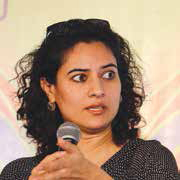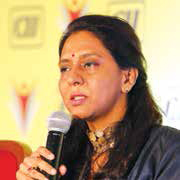The media is one of the most exciting industries to be in India. It is also one of the few fields, which has higher gender parity. However, being a woman journalist isn’t a cakewalk. There are many challenges that women journalists face while doing their jobs. The CII Wome- Nation conference gives us an opportunity to get an insight into the challenges and opportunities in journalism today. Corporate Citizen brings you the riveting session.

Pallavi Jha, Co – Chairperson, CII Indian Women Network – Western Region and Chairman & Managing Director, Dale Carnegie Training India, moderates the session with Sujata Anandan, Political Editor, Hindustan Times, Meenal Baghel, Editor, Mumbai Mirror, and Shaili Chopra, journalist and founder of shethepeople. com and tries to uncover the trials and tribulations of women journalists
Sujata: One of my former editors once told me that political journalists are not the makers of history but they are the makers of the makers of history. It was exciting as a young reporter to be waiting for policy decisions and sometimes when we used to cover the assembly, I have sat alone in galleries in rural areas where rural development bills are being passed. Those things were exciting. Then there were the 1992-93 riots in Mumbai. I can still remember going to the JJ Morgue and seeing the bodies piled up. That was terrible. I was with Illustrated weekly, which was a Times publication, and a senior editor hired four women journalists and one of them was me. At that time, a lot of people opposed this. The editor called me and said that we are going to Assam the next day. At that time Assam was burning, it was on fire. The other colleagues were angry that he was sending me, especially the men. They felt they should be the ones who are sent. In the end, I went there during a milestone in the country's history. I met student leaders then who are now senior leaders of the state. Those are the kinds of things you remember. Even in Mumbai, I think I was the sixth woman journalist who was reporting politics who stepped into the Vidhan Bhavan. It took politicians, especially from rural areas, a long time to take women journalists seriously, but eventually they have come around. I was very content in entertainment journalism, but I am lucky to have gotten into political journalism. I hated it at first but now I know it was what I am best at.

Meenal: I must confess that it has not happened. The maximum kind of pressure in this modern age comes from two sources. The first is corporate, and the other is the film industry. I think there is a need to control the narrative. The most pressure comes from these sources. Politicians, I must say are quite thick skinned and cool headed about it. I think they also know that there are no permanent friends and no permanent enemies. They have the maturity and sense to know that you win some and you lose some. As far as the BMC is concerned, it really depends on the institution you represent and the backing it gives you. If your publication or channel backs you, then you can get your point across.
I have been sued only once in my life (laughs). I called a politician what he was, and he called me and tried to intimidate me, and when he couldn't, he filed the case in his village, so that I would be forced to travel there. Fortunately, my company took the power of attorney and gave it to someone else - Sujata Anandan

Shaili: I think there are multiple layers to your question, and there is no simple answer to it. Quite honestly, I think a lot of people are watching television these days, and they are inherently involved in what they are getting. The reason I say this is that I don't know how many of you would enjoy television if it was plain and non-entertaining. The state of affairs on news television, with the loud debates and all is something people find truly entertaining. They are watching every day, and the TRPs and souring, because they truly enjoy it. It’s a lot about supply and demand. A lot of us like to have evening drawing room conversations discussing politics or even the state of the media. Who's really creating this type of media in the first place? It is the consumers, who love watching them and who are keeping the TRPs high. Today, if it wasn’t working, there would be course correction. Today you decide what you read, watch and buy. Everyone has become an editor in their own right. But I agree that fact checking is imperative. I think the state of journalism or even the idea of journalism is up in the air. What we report and how we report is being redefined. The good thing is that today we know who owns which media house. We know who is right oriented, left oriented or neutral. I think that is a good thing. People should know the source and motivation of their news conduit.
Meenal: To add to what Shaili said, I think social media has basically exposed everybody's political alliance. Journalists are supposed to be neutral, but on social media, the inclination comes out which has led to a polarisation in the media and in the consumer as well.

Shaili: I think the first part is that the media is the closest it gets to at least being somewhat fair when it comes to gender parity, as compared to other professions. Television of course has a greater presence of women than print. I’ve come from the television background where at least 70% of the journalists were women. The golden era of journalism, as we know it is dead. I discourage women who come up to me to seek advice regarding journalism. When we look at the field today, if your drive is to report something great then you really have to be in the data journalism space. If you are looking for money or fame, it is a long journey. There was a time 15 years ago when television had just opened up; many people rode the wave of the rise of television. TV has been a path-breaking story in India. Mobile is getting there but it still relatively slow. I personally think journalism is in the midst of a transformation. If you ask me if there is opportunity in social media, I would say yes, there is. If you want the opportunity to put your talent out there, whether you are a chef, painter or software professional, you have avenues no previous generation had before. If today you want to enter journalism, what is your drive? The kind of roles available in journalism is rapidly changing, and the future direction of the field is anyone’s guess.
The media is the closest it gets to at least being somewhat fair when it comes to gender parity, as compared to other professions. Television of course has a greater presence of women than print. I’ve come from the television background where at least 70% of the journalists were women. If you want the opportunity to put your talent out there, you have avenues no previous generation had before - Shaili Chopra
Meena: The reason isn't hard to understand. Even though there are many more women in the field today, there is still widespread misogyny. That is a given. Trolls by their very nature, are anonymous. They feel that women journalists would cow down if they were bullied. The way to deal with it is just to not respond to them. Just stick to the facts of the argument and don’t engage with trolls.

Sujata: Of course they can. However, I don't agree with your statement that women are far unsafe now than before. Now, television reports these incidents so people know about it. Earlier these incidents were relegated to the inside pages of newspapers. It looks now like violence against women has increased in India but I feel this has always been happening. It is just that it is being reported more now, and that is a good thing. As for the media, especially television, it has always been about the TRPs. Sensationalism sells, and the focus sometimes shifts to the media circus instead of the actual issue.
Meena: I think I would like to bat for the media here. The media has done a wonderful job in these cases. In the Nirbhaya incident, the media spotlight led to amendments in the rape law, and that is a huge thing, which may not have happened without the media. When was the last time since independence that women's safety was such a huge concern in national headlines? Yes, the media stumbles sometimes, but it has proved that it can be impartial, like in the case of Tarun Tejpal, a member of our own fraternity.
Shaili: I think that even though the media may sensationalise incidents, at least they are staying in focus. It's better than ignoring them and not reporting on them, which used to happen earlier.
Sujata: No, I have not. I think of the story carefully, and I have been sued only once in my life (laughs). I called a politician what he was, and he called me and tried to intimidate me, and when he couldn't, he filed the case in his village, so that I would be forced to travel there. Fortunately, my company took the power of attorney and gave it to someone else. The company was very strong and managed to move it to the Bombay High Court. I am one of those old-fashioned journalists who always checks both the sides before reporting. I have lost many stories, but I have never reported them if I could not 100% back them with facts.
Meena: Yes, of course it is. Journalism hours are crazy. A lot of women drop out as they rise in the hierarchy because it becomes difficult to manage families as well as keep the hours. This is something that proprietors need to consider. This is the reason that there are very few women at the top in newsrooms.
Politicians, I must say are quite thick skinned and cool headed about it. I think they also know that there are no permanent friends and no permanent enemies. They have the maturity and sense to know that you win some and you lose some -Meenal Baghel
Shaili: To answer your question, I have never found a conflict of interest but the organisations that I have worked in have found them. There have been times when I have been told that I cannot cover a particular story. Audiences today know which media house is owned by whom, and they also understand the inclination of media houses.
By Neeraj varty